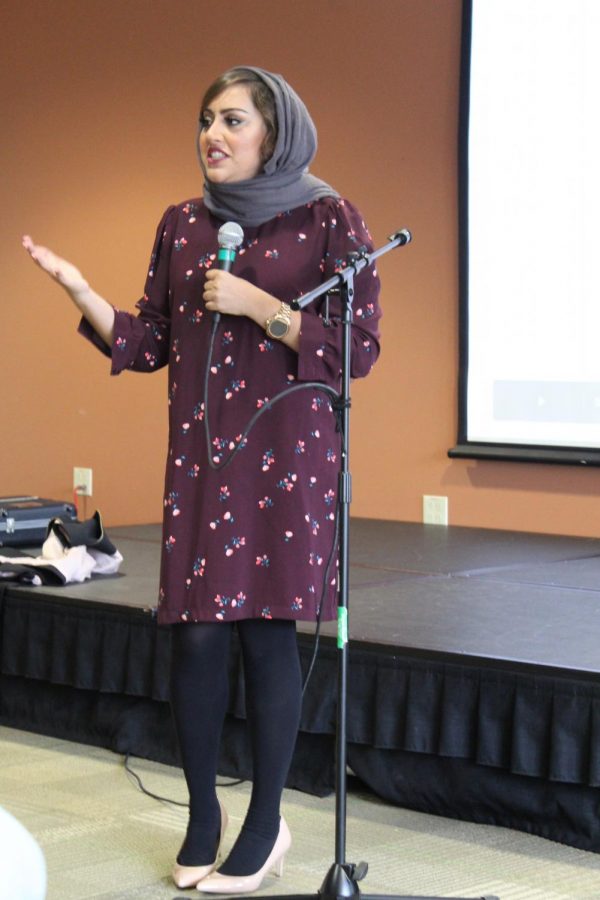Women in Politics are Not Just Labels: (Bushra Amiwala discusses being a female Muslim elected official)
Elected official Bushra Amiwala speaks before the College of DuPage in an event hosted by the school’s Girl Up club on empowering women in politics (photo by Kate Zadell)
November 7, 2019
After releasing a video explaining why she turned down corporate money to aid her election hopes for the Cook County Board, then 19-year-old Bushra Amiwala was surprised to receive messages saying, “I love what you stand for, but could you lighten the lipstick next time.”
Now, after winning a seat on the Skokie School Board at age 21, becoming the youngest Muslim elected official in America, Amiwala has learned succeeding as a minority woman in politics means knowing exactly how every article about you starts.
“No matter how much you try to run from it, every article starts off painting me as the poor Muslim woman hurt by the Trump Administration who is now running for office,” said Amiwala. “I don’t want to be the token Muslim person. People talk about my identity and my appearance more than my policy ideas.”
Amiwala, currently a senior at DePaul University, was invited to speak at the College of DuPage on Oct. 24, by the school’s Girl Up club, an international organization founded by the United Nations to promote female empowerment. She told the audience she doesn’t want to be alone as one of the only members of her background and age becoming politically active.
“We are all leaders,” said Amiwala. “Sometimes we make leadership out as a hard to reach ideal. But you really can balance the workload. You can be a leader in your own social circle. Everyone can and should become politically active if you have the passion and desire to serve.”
After Amiwala’s talk, Mariyyah Khan, vice president of COD’s Girl Up, said the first step towards woman empowerment involves dismantling labels and combating stereotypes.
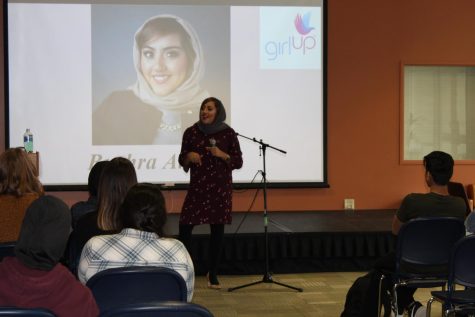
“Just because Amiwala is Muslim does not mean that’s her whole identity,” said Khan. “There’s so much more, but the media only focuses on the Muslim aspect. We, too, as Muslims fall into this. By constantly feeling the pressure to break the stereotype that all Muslims are bad, we sometimes forget our own identities. Amiwala talked about wearing her hijab but still showing her hair. I used to struggle with that, too. When people look at me, they only see a Muslim. And members of my own community would say, you’re not a good Muslim if you’re showing your hair.”
Khan believes empowerment means staying true to yourself and having a platform to express your passions while finding confidence as an individual.
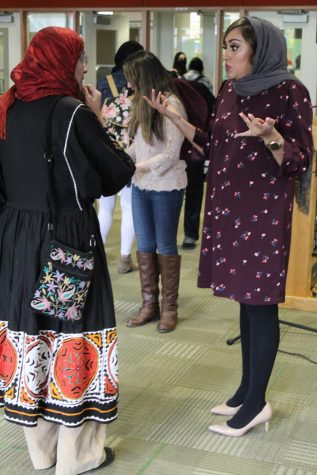
“Amiwala said she tried being someone else, but learned being genuine with people gets you more public support,” said Khan. “She was so nice and engaged with us. Now I can connect to her as a normal person who goes through some of the same issues as me. It was inspiring, because I, too, have conservative Pakistani parents who worry about what people will say if I behave a certain way. I, too, struggle with breaking that stereotype to allow me to speak out about the things I’m passionate about.”
For Amiwala, finding empowerment has always meant embracing her labels while also trying to escape from their constrictions.
In the wake of the Sept. 11 terrorist attacks, Amiwala remembered being a preschooler in Rogers Park and her mother telling her to not unnecessarily bring up her Muslim identity.
“It’s not a dramatic experience or a traumatic incident; it’s those everyday moments that remind you you’re different,” said Amiwala. “You realize what it looks like to not have representation. After telling my whole class I was Muslim, everyone then knew what being a Muslim truly was.”
Amiwala moved to Skokie at the age of nine.
Right before beginning high school, after witnessing the harassment of a woman shopping in a burqa, Amiwala explained how easy it can be to perpetuate stereotypes.
“I knew there was this stereotype associated with Muslim women that we’re shy, timid and passive,” said Amiwala. “People use this to justify saying Muslim women are oppressed. Because the woman in the burqa said nothing, I thought she was furthering this stereotype. But once I gained a deeper perspective, I realized I was blaming the victim in that situation.”
Amiwala described high school as the time she became inspired to influence the next generation of change. To get people to start asking questions, she began wearing her hijab.
“Nobody in my family wears the hijab, but if you want to be representative of Muslim women, the best way is to wear the hijab,” said Amiwala. “My junior year, I became the first student from Illinois to become the national debate champion at Harvard University. I was also elected prom queen. However, no one knew my name. Everyone just knew me as the Muslim girl; the girl that wears the head scarf.”
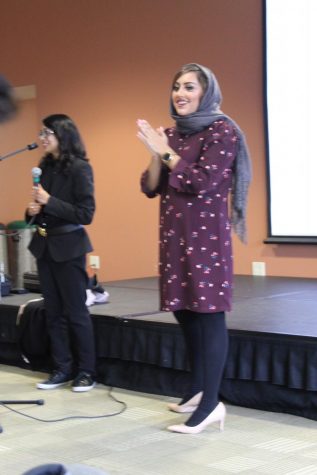
While staying proud of her identity, Amiwala realized the difficulty of escaping her label. When she ran for the Cook County Board, she was on the cover of Time Magazine, was named Glamour Magazine’s College Woman of the Year, and became the public peace ambassador for the United Nations. However, she said, no one knew her name. Every headline read, Muslim teen running for office.
Lost in the headline were the social reasons Amiwala decided to enter politics. In high school, she worked at five different non-profits dealing with food insecurity, homelessness and poverty in Rogers Park. After witnessing the quality of education difference between Rogers Park and Skokie, Amiwala won a grant at a social enterprise competition to create Task Free Learning, a service offering teachers to Chicago public school students to instruct fundamental life skills that are not taught in classrooms and are often difficult for minorities to acquire.
“When working at a food pantry, I saw the numbers of people dramatically increase at the end of the month because their benefits were running out,” said Amiwala. “I realized, if I wanted to do anything about hunger, I had to start at the political side. So, I got an internship and did legislative canvassing work until we got state funding for benefits within Rogers Park raised.”
One of her first forays into the political world was exploring the conservative values her family upheld. Her idea of Republicans came from the media, and Amiwala wanted to see if she was holding any unconscious biases towards their beliefs. She became a field intern for U.S. Sen. Mark Kirk (R-Ill). Her task was going to Republican households to ask where they stand on Kirk’s policy agenda. She mistakenly didn’t read the questions beforehand.
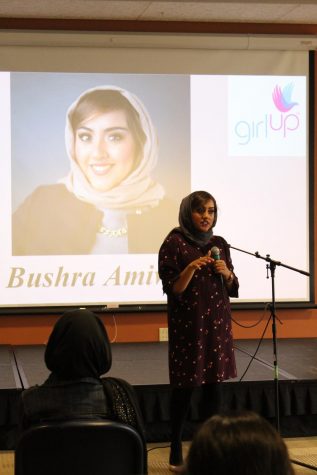
“First question: On a scale of one to 10, how fearsome are you of an Islamic terror attack on U.S. soil?” said Amiwala. “The voter at the door said, ’10.’ I asked her why. I realized I had the opportunity to talk with someone who is both scared of me and fundamentally disagrees. She, like many others, would often say, ‘you are the first Muslim I’ve ever met.’”
When addressing this with other Kirk interns, they challenged Amiwala to find any positive examples of Muslims in the media. Amiwala said she realized whenever a Muslim was depicted in the media, they were either the victim of violence or the perpetrator. This negative depiction fuels the self-conscious impression of being less than other Americans.
Amiwala’s first run for office came two months after U.S. President Donald Trump was inaugurated. Trump’s travel ban of mostly Muslim countries and hostile rhetoric towards the two Muslim women in Congress, Rep. Ilhan Omar (D- Minn.) and Rep. Rashida Tlaib (D-Mich.), was coupled in the media with violence against Muslims, such as a New York Muslim judge found dead in a river.
“(Trump’s rhetoric) did serve as an inspiration, but personally, it also intimidates me from national politics,” said Amiwala. I am scared and intimidated of being attacked at a national level. But I don’t let that prevent me from taking local action.”
After she lost her first election, Amiwala had breakfast with the official who defeated her. He told her his granddaughter is nine, and he hopes in 10 years she will end up just like her. He helped convince Amiwala to run for the Skokie School Board.
To encourage empowering girls like her, Amiwala serves on the board of directors for the Indo-American Democratic Organization to help train candidates across Illinois. She also serves as UNICEF’s public peace ambassador to focus on the humanitarian side of female empowerment.
Khan believes proper representation is crucial to giving girls a powerful figure to aspire to. She said she wishes she could convince her parents, like Amiwala did, that it’s alright to let your daughter express herself and go into politics.
“When Trump was elected, my whole family was concerned,” said Khan. “I thought racism would spike with people saying, ‘Why are you here?’ ‘Go back to your home.’ I feared people questioning my hijab. Everyone said be careful, carry pepper spray, and don’t talk about politics. That made me so angry because I’m very passionate about my beliefs. Now that I’m older, I realize fear can lead to empowerment. Fear gives me the reason to speak up.”

